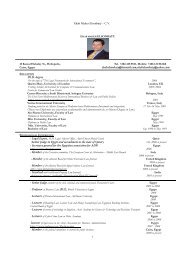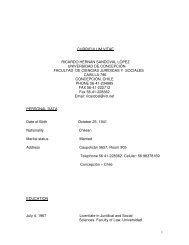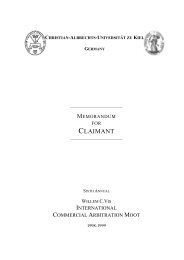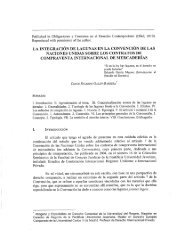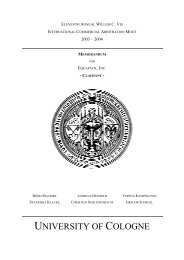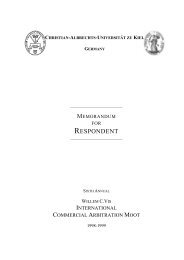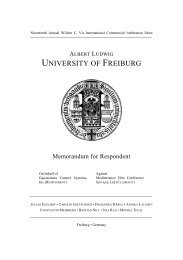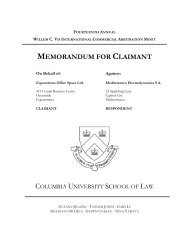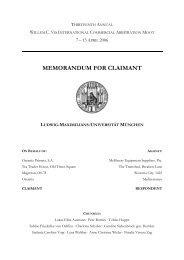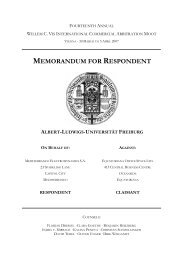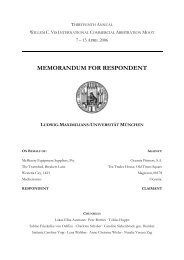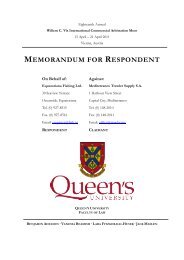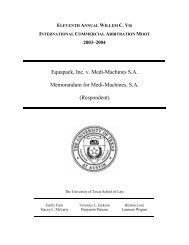MEMORANDUM FOR RESPONDENT - CISG Database
MEMORANDUM FOR RESPONDENT - CISG Database
MEMORANDUM FOR RESPONDENT - CISG Database
You also want an ePaper? Increase the reach of your titles
YUMPU automatically turns print PDFs into web optimized ePapers that Google loves.
The only part of the CICA Rules that are specifically for international arbitrations are in<br />
Chapter VIII, Articles 72 to 77, which do not give a complete set of rules but only certain<br />
modifications of the otherwise applicable rules. In fact, the CICA Rules are mostly used for<br />
domestic arbitrations, as almost 80 percent of the cases before the CICA are domestic<br />
[Procedural Order No. 2, Clarification 11].<br />
3. The arbitration agreement can only be interpreted to show a common<br />
intention to submit to ad hoc arbitration.<br />
i. The ambiguity in the arbitration agreement may only be salvaged to<br />
refer to ad hoc arbitration.<br />
14. In cases containing ambiguous arbitration clauses which make no reference to any<br />
arbitral institutions, courts have tried to remedy the clauses by referring the parties to ad hoc<br />
arbitrations.<br />
15. For example, in Libyan National Oil Company v. WETCO (Switzerland), the<br />
arbitration clause provided that “disputes shall be settled by arbitration in Geneva”. Although<br />
no arbitral institution was named, the court decided to refer the parties to ad hoc arbitration,<br />
using local rules. In Della Sanara Kustvaart-Bevrachting v. Fallimento Cap. Giovanni<br />
(Italy), the arbitration clause, which states “General average/arbitration, if any, in London in<br />
the usual manner”, was held to refer to ad hoc arbitration. In Guangdong Agriculture<br />
Company Ltd. v. Conagra International (Hong Kong), the court held that although the<br />
reference to the “rules of Hong Kong” could be to one of several sets of arbitration rules, the<br />
intention to arbitrate was clear and the Model Law could resolve imprecision in the number<br />
of arbitrators. Therefore, should this Tribunal decide that the agreement to arbitrate should<br />
be upheld despite there being no reference to any arbitral institution, the arbitration<br />
agreement can only be enforced as an ad hoc arbitration.<br />
16. This position is bolstered by the fact that it would be patently unclear which set of<br />
procedural rules should apply, if this Tribunal finds in favour of institutional arbitration.<br />
Article 72(2) of the CICA Rules provides that the parties are free to decide to use other rules,<br />
including the UNCITRAL Arbitration Rules. However, Article 5 of the CICA Rules deems<br />
the parties to have agreed to use the CICA Rules, unless the parties have agreed otherwise in<br />
writing prior to the organisation of the arbitration. This Tribunal is thus bound to apply the<br />
CICA Rules if it holds that it has jurisdiction as an institutional arbitral tribunal. However, to<br />
7



